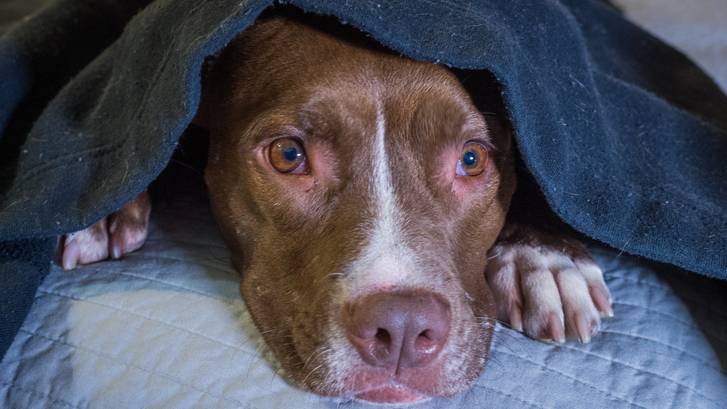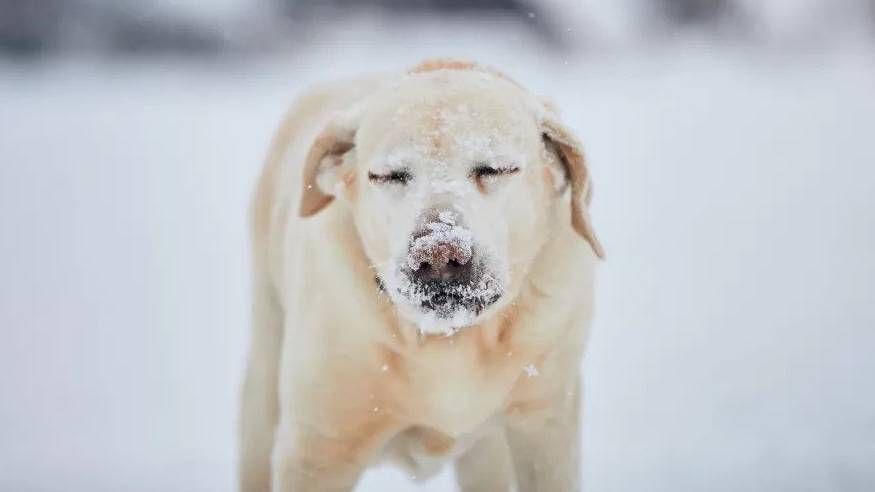Why is my dog shaking and panting? Vet's guide to dog shivering
Is your dog shaking or shivering more than usual? Read on for possible causes and solutions!

Get the best advice, tips and top tech for your beloved Pets
You are now subscribed
Your newsletter sign-up was successful
As a dog owner, you’re probably highly attuned to what’s normal for your pet. So, if you see your dog shaking more than usual, or you notice your dog shivering, you might wonder what’s causing it.
Dogs can shake for a number of different reasons. Some causes are behavioral — like anxiety and fear — and others are physical — like Cushing’s disease.
This article will explore a number of causes and solutions about why your dog may be shaking their body or head, including what to do if you notice your pup shivering more than usual.
- Best pet insurance: Give yourself some peace of mind
- Do dogs get cold? How cold is too cold for dogs
- Why is my dog panting so much?
Why does my dog keep shaking his body?
There are many reasons your dog might be shaking his body. Whilst there are numerous rare neurological conditions that can cause a dog to start shivering, the most common causes of dog shaking are below.
Itchy skin
Dogs can shake their fur and shiver if their skin is itchy. You may also notice the coat twitching as the muscles under the skin react to the itch. If this is a possible cause for your dog’s itch you should take them to the vet for anti-itch treatment. Your vet can also fully investigate to find out what the underlying cause of the problem is.
Stressed, afraid, or anxious
Stress and fear can cause dogs to shake uncontrollably. You might notice your dog shaking when fireworks are going off, or during a thunderstorm, if they are noise phobic. If you can’t avoid the scary thing in future, you may need to consult a canine behaviorist to help your dog get over their fear.

Excitement
Some dogs shake with excitement. This type of shivering is usually short, fast vibrations interspersed with short pauses where there is no shaking. You might notice this type of shaking if your dog sees something that excites them, such as another dog or something they want to chase.
Get the best advice, tips and top tech for your beloved Pets
Toxins
Some toxins, especially moldy food, can cause your dog to shiver. These ‘tremors’ can get worse and make some dogs very ill. If there’s any chance your dog’s shaking is related to toxin ingestion you should get them to a vet right away.
He is cold
Just like us, dogs shiver when they’re cold. Shivering and trembling in the cold is caused by involuntary muscle contractions designed to produce heat. If this could be your dog, make sure he is dry and offer him a warm jumper, coat, or blanket.

Minor “petit mal” seizures
Some dogs have “petit mal” type seizures that can look like shivering. Of course, full seizures are more than a little shiver – in this case you’ll see unconsciousness and paddling of the legs – but petit mal seizures can cause loss of concentration and tremors without full unconsciousness.
Low blood sugar
Low blood sugar can cause tremors and shaking, as well as lethargy. It’s most common in diabetics, young puppies, and very small dogs such as Chihuahuas.
Hypoglycaemia should be treated as soon as possible – some thick sugar solution or full-sugar jam on the gums should resolve it, but you should follow up with your vet urgently to find the cause.

Distemper
Distemper is one of the most serious causes of dog shaking. It occurs mainly in unvaccinated dogs. If your dog is not fully vaccinate and has unexplained shaking they should visit the vet straight away for diagnosis and treatment. Distemper is contagious so if you suspect distemper in your dog, please warn your vet so they can prepare.
Cushing’s disease
Cushing’s disease can cause shaking and panting in dogs. You’ll also notice excessive thirst and urination as well as some changes to their skin and fur. Cushing’s disease needs treating by a vet.
Why is my dog shaking his head?
Dogs that are shaking their head usually have some form of irritation. Usually, it is the ears that are irritated, perhaps because of an infection or allergic reaction. Sometimes, dogs can shake their head because their teeth are irritated or sore, although this is less common.
What to do if your dog is shaking
If your dog is shaking, it’s worth having a think about some of the causes listed above. In some cases, the cause will be obvious – for instance, if a thunderstorm is happening, or if your dog has cornered a mouse. However, if you’re unsure about the cause of your dog’s shaking you should arrange to visit a vet sooner rather than later.

When to see your vet about your dog shaking
If your dog is shaking and you aren’t sure of the cause, it’s best to visit a vet to get them checked out. You should do this urgently if your dog has been exposed to moldy food or is:
- Vomiting
- Lethargic
- Unvaccinated
Conclusion
When your dog is shaking or shivering, there are many potential causes. Whilst several of these are normal, such as shaking due to the cold or excitement, others are more concerning. Some causes of dog shaking, panting, and trembling can be an emergency so you should pay close attention to your dog and visit your vet if you’re worried.
After graduating as a vet from the University of Nottingham in 2016, Dr. Joanna Woodnutt went on to practice companion animal medicine in the Midlands. She quickly developed a love of consulting and helping clients with medical problems such as dermatology, behavior and nutrition - anything that involved helping clients understand their pets better.
Jo started writing about pet health in 2017, realizing that it meant she could help even more pet parents. Since then, she has written for countless online and print publications and is a regular contributor for Edition Dog Magazine. Jo is the director of The Veterinary Content Company, which she founded in 2020. She is also the founder of Petlearnia, a platform that provides pet e-learning courses for pet parents.
Jo now lives in the Channel Islands with her husband Ian and terrier Pixie.

